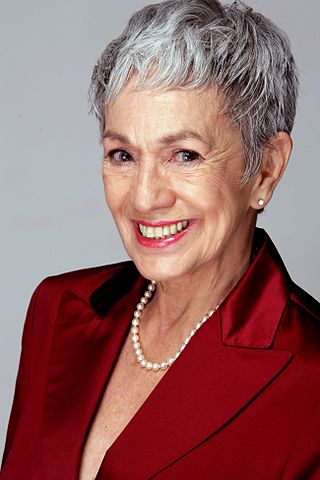Related Research Articles

The American Film Institute (AFI) is an American nonprofit film organization that educates filmmakers and honors the heritage of the motion picture arts in the United States. AFI is supported by private funding and public membership fees.

Broadcast Music, Inc. (BMI) is a performance rights organization in the United States. It collects blanket license fees from businesses that use music, entitling those businesses to play or sync any songs from BMI's repertoire of over 22.4 million musical works. On a quarterly basis, BMI distributes the money to songwriters, composers, and music publishers as royalties to those members whose works have been performed.

The Ed Sullivan Show is an American television variety show that ran on CBS from June 20, 1948, to March 28, 1971, and was hosted by New York entertainment columnist Ed Sullivan. It was replaced in September 1971 by the CBS Sunday Night Movie.

Fiorello H. LaGuardia High School of Music & Art and Performing Arts, often referred to simply as LaGuardia or "LaG", is a public high school specializing in teaching visual arts and performing arts, located near Lincoln Center in the Lincoln Square neighborhood of the Upper West Side in Manhattan, New York City. Located at 100 Amsterdam Avenue between West 64th and 65th Streets, the school is operated by the New York City Department of Education, and resulted from the merger of the High School of Music & Art and the School of Performing Arts. The school has a dual mission of arts and academics, preparing students for a career in the arts or conservatory study as well as a pursuit of higher education.

Roberta Peters was an American coloratura soprano.

Martina Arroyo is an American operatic soprano who had a major international opera career from the 1960s through the 1980s. She was part of the first generation of black opera singers to achieve wide success.

Alwin Nikolais was an American choreographer, dancer, composer, musician, teacher. He had created the Nikolais Dance Theatre, and was best known for his self-designed innovative costume, lighting and production design. Nikolais gave the world a new vision of dance and was named the "father of multi-media theater."

Murray Louis was an American modern dancer and choreographer.

Ruth Page was an American ballerina and choreographer, who created innovative works on American themes.
The NAISDA Dance College is a performing arts training college based in Kariong, New South Wales for Aboriginal and Torres Strait Islander people in Australia. It was established as the Aboriginal Islander Skills Development Scheme (AISDS) in 1975, which became the National Aboriginal and Islander Skills Development Association (NAISDA) in 1988. The date of establishment of the college is usually cited as 1976, although some sources report it as 1975.

Chicago a cappella is a non-profit organization devoted to furthering the art of ensemble singing without any instruments. The group of professional singers began in 1993 by Jonathan Miller and conduct a series of performances annually. The organization displays a yearly subscription series for Chicago residents, produces studio recordings as well as live and broadcast-media musical content, and performs on tour and in special arrangements. The ensemble is known for their outstanding vocal abilities, innovative programming, and have a reputation of being a leader within the choral field. Expanding from a collection of a Gregorian chants to the Beatles and beyond, the singers are known for their wide repertoire including early works, vocal jazz, and spirituals. The ensemble is also a champion of performing works by living composers.

Ernestina Ramirez was an American dancer and educator, best known as the founder and artistic director (1970–2009) of Ballet Hispanico, the premier Latino dance organization in the United States.
Alfredo Antonini was a leading Italian-American symphony conductor and composer who was active on the international concert stage as well as on the CBS radio and television networks from the 1930s through the early 1970s. In 1972 he received an Emmy Award for Outstanding Achievement in Religious Programming on television for his conducting of the premiere of Ezra Laderman's opera And David Wept for CBS television during 1971. In addition, he was awarded the Order of Merit of the Italian Republic in 1980

CBS Cable was an early but short-lived cable television network operated by CBS, Inc., dedicated to the lively arts. It debuted on October 12, 1981 and ceased operations on December 17, 1982.
Camera Three was an American anthology series devoted to the arts. It began as a Sunday afternoon local program on WCBS-TV in New York and ran “for some time” before moving to the network on CBS at 11:30 a.m. Eastern time, airing from January 22, 1956, to January 21, 1979, and then moved to PBS in its final year to make way for the then-new CBS News Sunday Morning, which incorporated regular segments devoted to the arts. The PBS version ran from October 4, 1979, to July 10, 1980.
The Asian American Dance Theatre (AADT) was a dance performance and educational non-profit organization in New York. It featured traditional Asian folk and classical dances along with contemporary pieces that evoke Asian forms and sensibilities. AADT was a pioneer in the development of Asian American dance.
Diavolo | Architecture in Motion is an American dance company founded by Jacques Heim in 1992. The company's movement style encompasses modern dance, acrobatics, and gymnastics. Diavolo has been based in Los Angeles since its founding and has toured across the United States as well as Europe, Asia, and Latin America.
My Heart's in the Highlands is a one act play by Armenian-American dramatist and author William Saroyan, adapted from his short story, "The Man with the Heart in the Highlands". Saroyan's first play, it is a comedy about a young boy and his Armenian family. It was produced on Broadway at the Guild Theatre.
CETA Employment of Artists(1974–1981) refers to the Comprehensive Employment and Training Act (CETA), which federally employed more than 10,000 artists – visual, performing, and literary – during a span of eight years. This was the largest number of artists supported by Federal funding since the Works Progress Administration (WPA) of the 1930s. It is estimated that an additional 10,000 arts support staff were funded as well. During its peak year, 1980, CETA funding for arts employment funneled up to $300 million into the cultural sector – and the economy – of the United States. In comparison, the National Endowment for the Arts budget that year was $159 million.
Recital Hall is an American musical television program that debuted on NBC on July 8, 1951, and was broadcast intermittently until 1955.
References
- ↑ "Television and the Performing Arts - A Handbook and Reference Guide to American Cultural Programming" Rose, Brain G. Greenwood Press, New York, 1986, P. 43. ISBN 0-313-24159-7 Television and the Performing Arts - A Handbook and Reference Guide to American Cultural Programing - CBS Repertoire Workshop on Google Books
- ↑ Repertoire Workshop From Chicago - Carmen and Jose - featuring The Ruth Page Ballet on the www.chicagofilmarchives.org